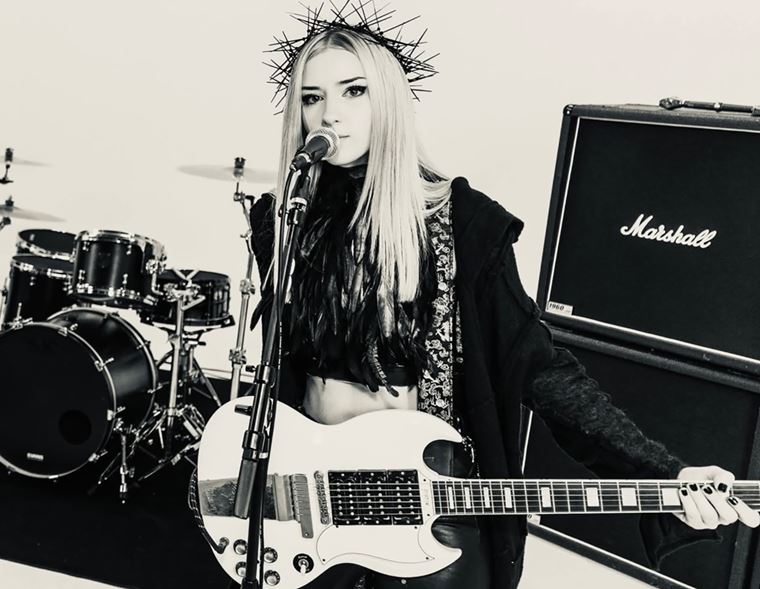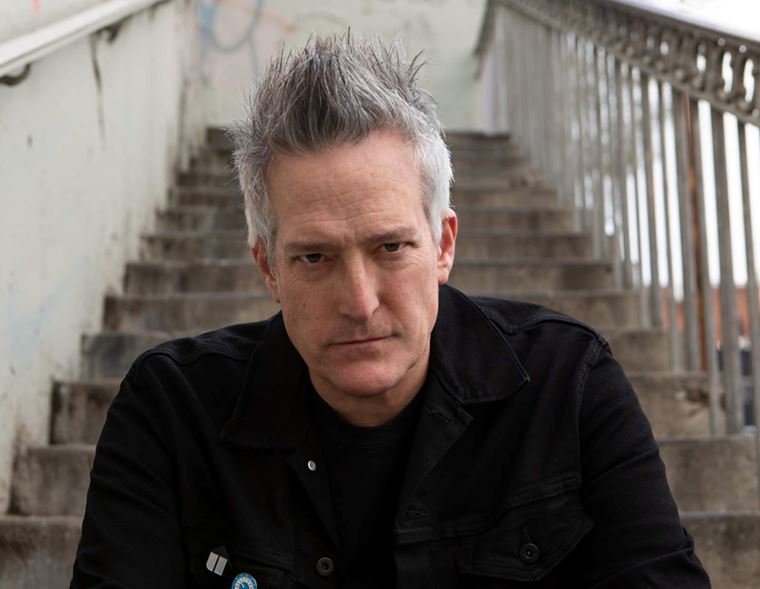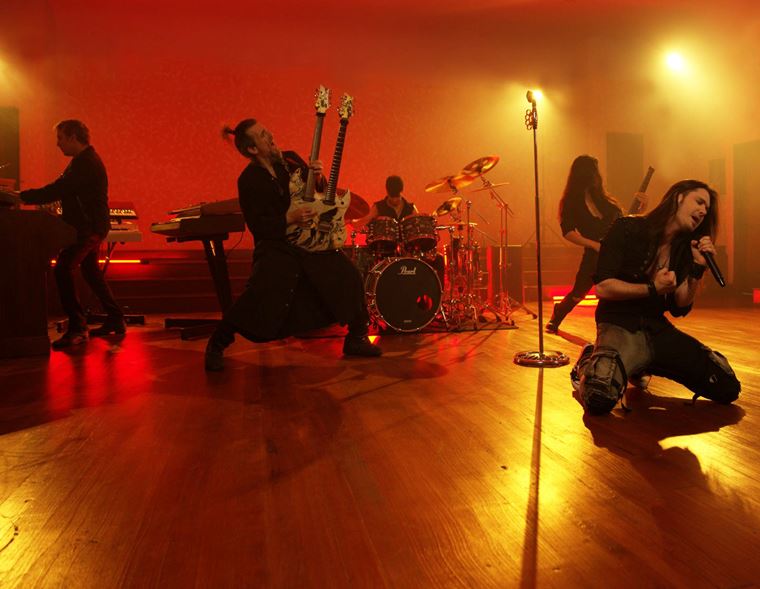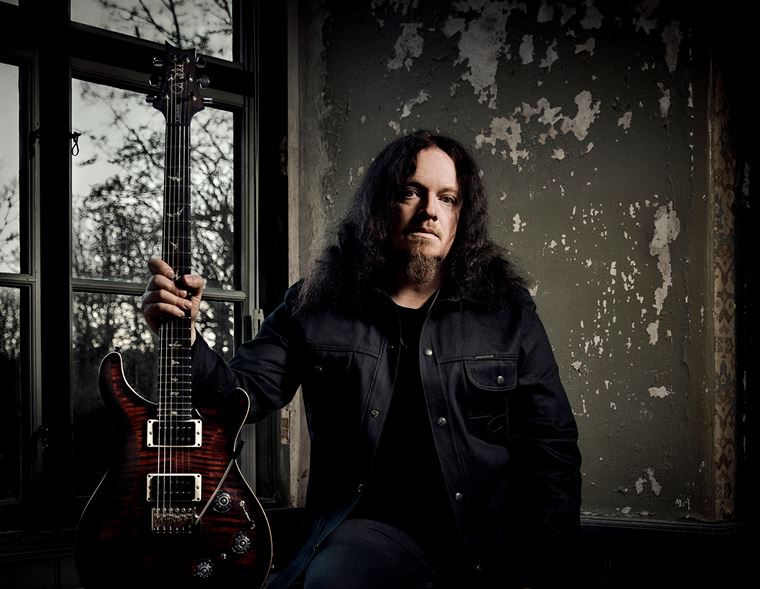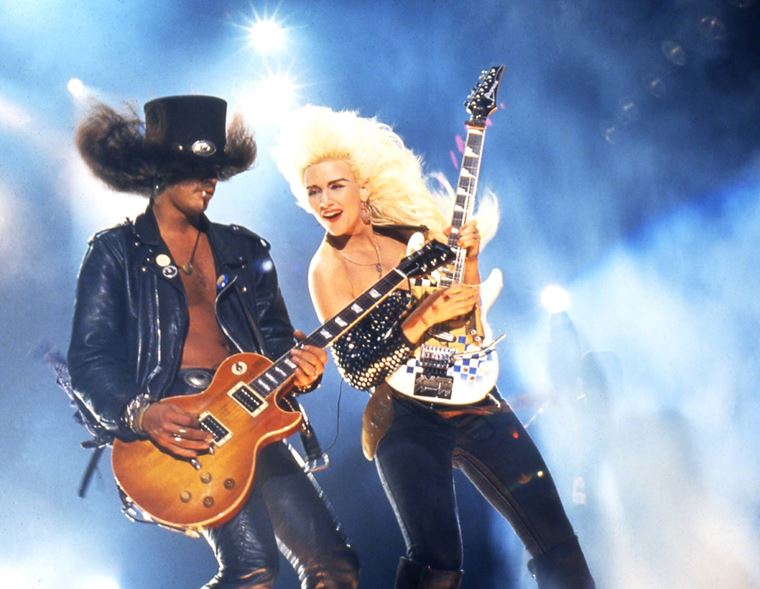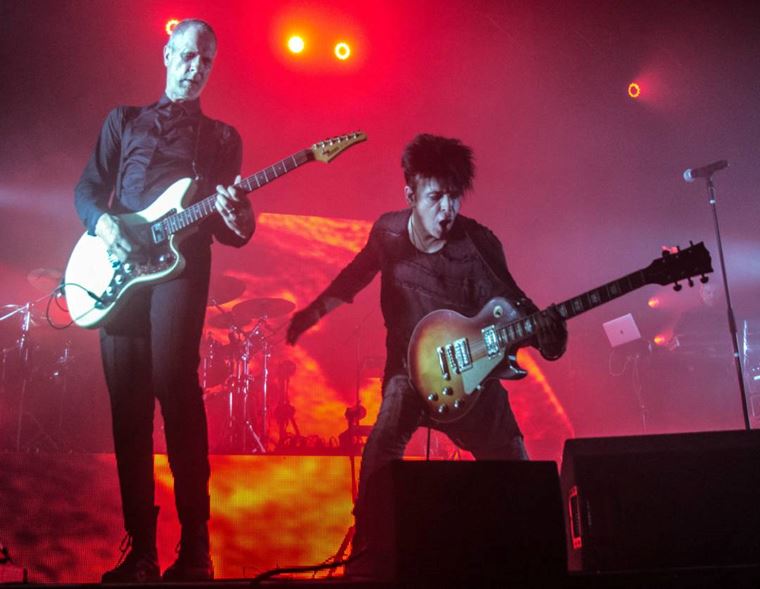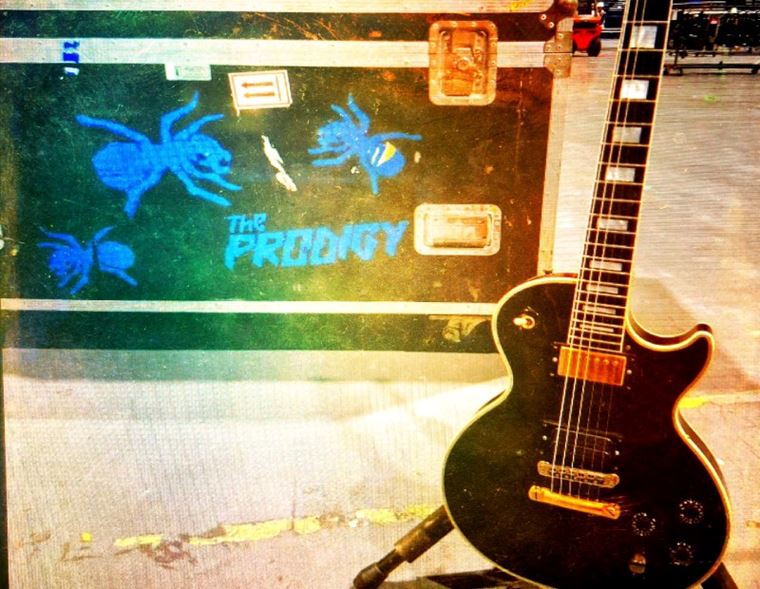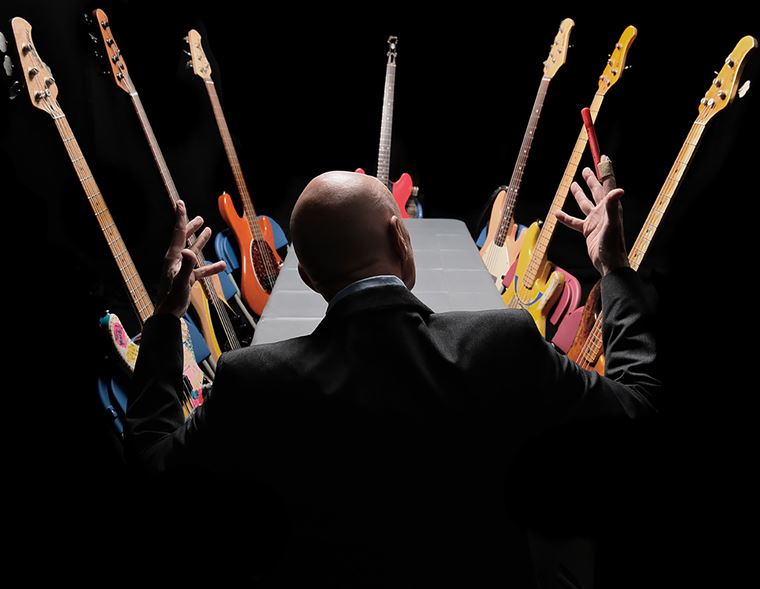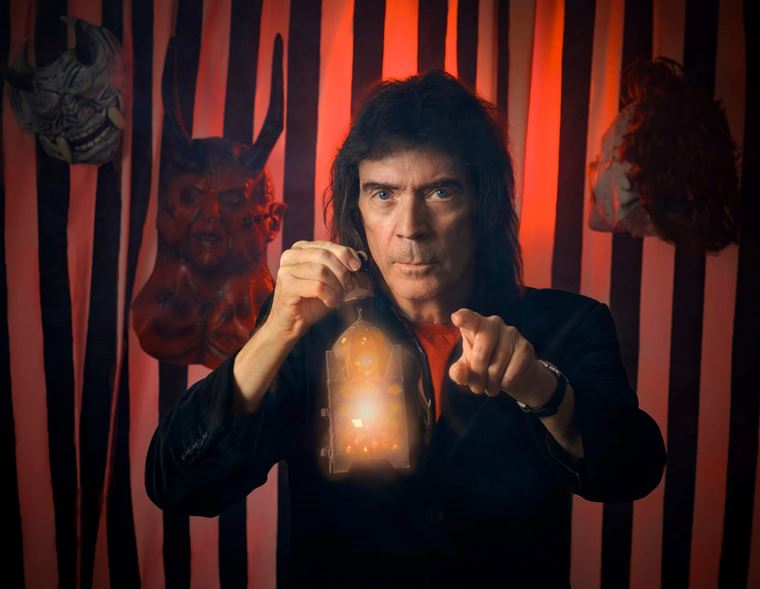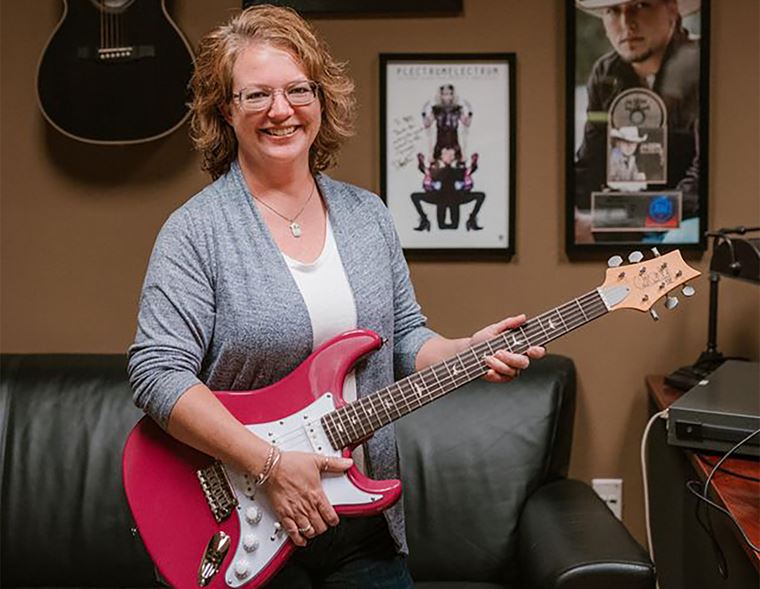The guitarguitar Interview: Chase Brawner from 3TEETH
Published on 16 August 2019
You know your band is getting places when you are hand-selected to play support slots for both Tool AND Rammstein! 3TEETH are such a band. The LA-based quintet have been bringing their high-production, menacing Industrial Metal to ever-increasing audiences since their debut record, 3TEETH, in 2014. Blending layers of spooky, dystopian electronics with swaggering, pulsing rhythms and lethal drop-tuned guitars, 3TEETH have provided an updated soundtrack to an aggro future. Given the current multiple crises throughout the world, it seems that they are a band for our times!
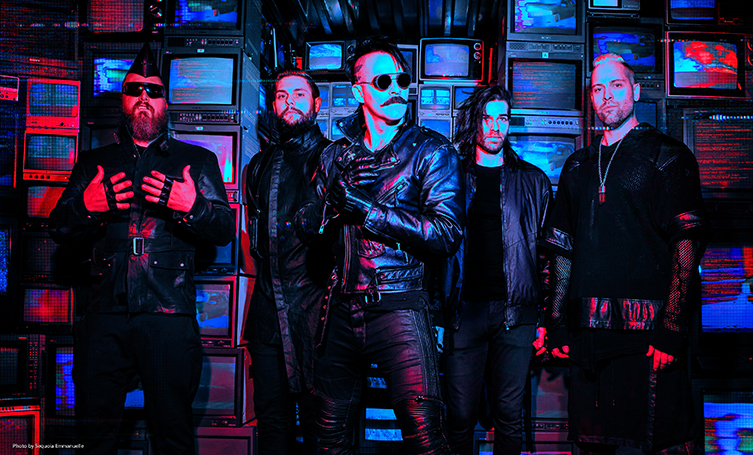
It seems to be from the heavier quarters of music that artists are willing to step up and speak about today’s troubles, whether those problems are external government issues or more insidious problems like facial recognition, unwilling consent to having sovereign laws broken and corporate spying & sharing of information. The enemy, as 3TEETH tell it, are in every home, behind every screen, fighting an ideological battle that we are a part of, whether we comprehend it or not.
Frontman Alexis Mincolla has this to say:
“We live in a world where we are all tethered to the same large scale prosthetic digital nervous system, and perpetually being manipulated and incentivized by the ideology de jour. Even the most independent thinkers are being pinned to one side or another as a result of it. Our goal is to jam this album in the cognitive gears that perpetuate this fiercely divisive rhetoric, by exposing the hypocrisy, idiocy, and insanity on all sides,” Mincolla says. “It’s time to carve out a non-conformist space between the left and right that doesn’t have a definable psychographic for corporations to exploit. METAWAR is here to tear down the walls of our memetic concentration camps.”
I came across 3TEETH when they played their first UK shows in 2015. Quickly making friends over bowls of noodles in Glasgow’s Sauchiehall Street, we kept in touch over the years as their career went from strength to strength. It’s hard not to like their gleeful sonic carnage: they definitely do not hold back! Live, they are a pretty fantastic prospect too: their powerful sound comes across particularly well in this context, and their frontman Lex is an icon in the waiting.
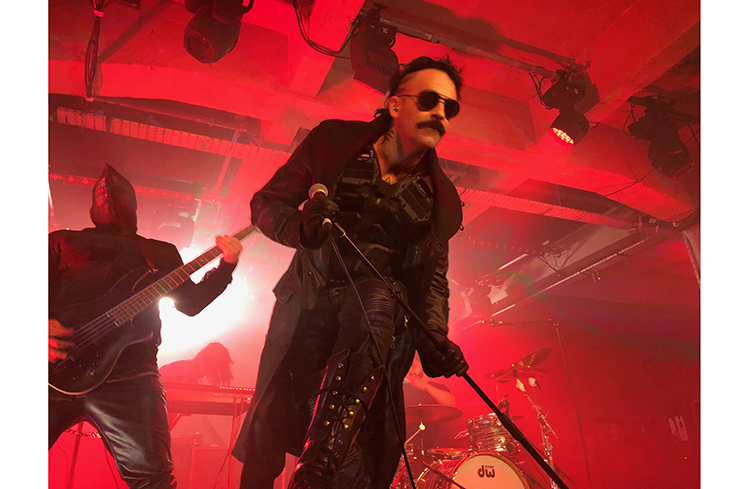
3TEETH recently visited our fair shores again, this time supporting Ministry and playing songs from Metawar, their new album released days after the show. Since I already had the good fortune of being scheduled to talk with the Ministry guys, I hit up 3TEETH guitarist and producer Chase Brawner for a chat. Chase obliged, and we spent an unusually sunny afternoon sitting outside at Clydeside venue SWG3, talking guitars and production.
That band had been forced to drive all the way from England to France and back in order to clear up a visa mishap, meaning they had to miss a show the previous night. Despite all this extra travel and hassle, Chase was in good spirits, happy to talk and an easy guy to hang with. The article that follows is our conversation, almost verbatim, until he got the inevitable call to soundcheck.
Read on for Chase’s production tips, custom guitar string gauges, his upbringing in Southern California and his unexpected love for INXS...

Guitarguitar: So, I’ve got my sheet with some questions and some things to hit on, but we’re just gonna have a blether about guitars.
Chase Brawner: Totally.
GG: Amps and recording, that sort of thing.
CB: It’s good that we’ve got this coffee. I am, uh...needing it.
GG: Well, thanks for still agreeing to talk to me!
CB: Yeah, of course dude! It’s actually not like I have that much stuff to set up. I mean, the fly rig, at least for me, is like...(Line 6) Helix, guitar, cables.
GG: Well, let’s start right there then! So, last time we met, that would’ve been...was that the end of 2015?
CB: (laughs) Yeah! I was playing a Line 6 XT200, (he maybe means the POD XT Live: Ray) like old, super old. I actually got it off of Andrew’s (3TEETH member) dad, paid him a hundred bucks for it and I used that ever since we played our first show in like 2014 until like 2016. And then I switched from that to the Kemper.
GG: Right.
CB: You know?
GG: Is that what we would hear on the record?
CB: No, this last one?
GG: Yeah.
CB: No. On Shutdown.exe, we had a Kemper, it (the guitar) had some plugins on it, but it was mainly the Kemper. This last record is where we really nailed the guitar tone.

GG: This last record being Metawar, which we haven’t heard yet (it was released later that week), but there’s like about 4 singles from that already, right?
CB: Yeah, four or five, including the cover.
GG: Which one’s the cover?
CB: Foster the People, Pumped up Kicks.
GG: That’s a cover?
CB: Yeah!
GG: I was wondering! Because it’s a ‘sing-ey’ tune!
CB: Oh yeah!
GG: I was thinking ‘Is this a new direction?’
CB: It’s funny, we were thinking, you know, before we went on tour with our buddies Whores, we wrote a bunch of demos, maybe twenty, twenty-five demos before we left. This was to have the bulk of recording done while we were away for two months, cuz we’re not that disciplined about writing on the road.
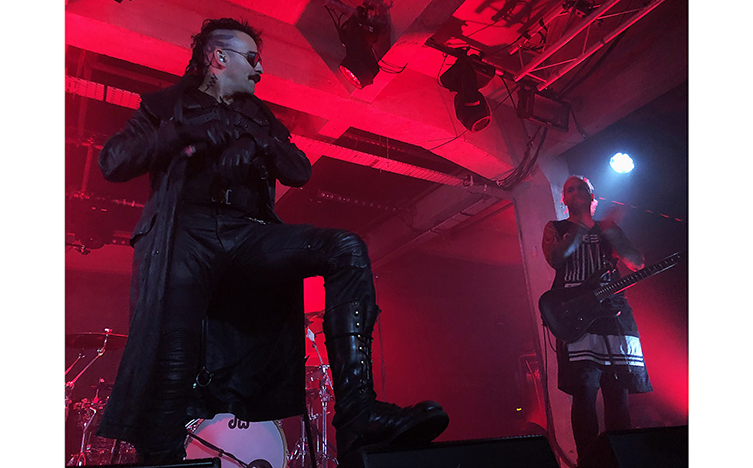
GG: There are other things to do when you’re touring.
CB: Yeah, so not yet at least until we have like a bus with a fuckin’ studio in it and stuff. But yeah, we went out on tour and wrote like twenty-five tracks that were a little bit softer than what the Metawar album is now, they were a little more Depeche Mode-y, kinda vibey tracks like that, which we did keep, one or two of ‘em, and you’ll hear ‘em. Like Blackout is kinda like that, it’s more, um, still kinda up-tempo but has a good bassline, and melodic, synth-pop leads and...you know.
GG: It’s not quite so overtly aggressive.
CB: Yeah, totally. And I think we’ve done that on all three of our albums, you know, we’ve had at least 2 or 3 that are more...grabbable, kinda...
GG: Accessible?
CB: Accessible, yeah.
GG Because you ned to have little elements...see if...things like Divine Weapon (from Shutdown.exe, 2nd 3TEETH album), when that kicks in, it’s like Boom! A motherfucker!
CB: It’s like fuckin’, it goes from 0 to 100. We like to do that with two contrasting parts. It’s kinda like how I do artwork, it’s like its either really plain and washy or it’s like splatterhouse.
GG: Yeah, I get you! So, Divine Weapon, for the sake of it, because it’s one of those ones that has quite a few signature 3TEETH moments. You’ve got the kinda pulsey, gated synths which is a very big, important thing, and when the guitar comes in, it’s huge. So, let’s get into the nuts and bolts of that: how many guitar tracks are you taking up for that huge rhythm part?
CB: That was just two.
GG: Just two?
CB: Yeah, left and right but, you know, it’s really what the fuckin’ bass is doing because the guitars...if I were to go back into the recording, and back into the session and isolate the guitars...actually, there might have been three? Maybe I started to do the mono one...
GG: That’s still not loads!
CB: No!
GG; That’s still relatively few!
GG: Yeah, totally! I think, for Divine Weapon, it was two guitars, panned left to right 50/50, one was a Kemper tone I think, and one was like a Waves plugin. I normally do all my demos in Waves, in a plugin called GTR. And for Metawar, from the demos, some of the guitars I didn’t even have to re-track. I got a certain vibe with the guitars that I was doing at my house, that I couldn’t recreate when we went with Sean (Beaven, legendary producer of Nine Inch Nails, Marilyn Manson fame) so we used the demoes and also re-amped some parts too. Sean’s super-knowledgeable about that. I mean, I could’ve done that, but he had a lot more pedals that I did.
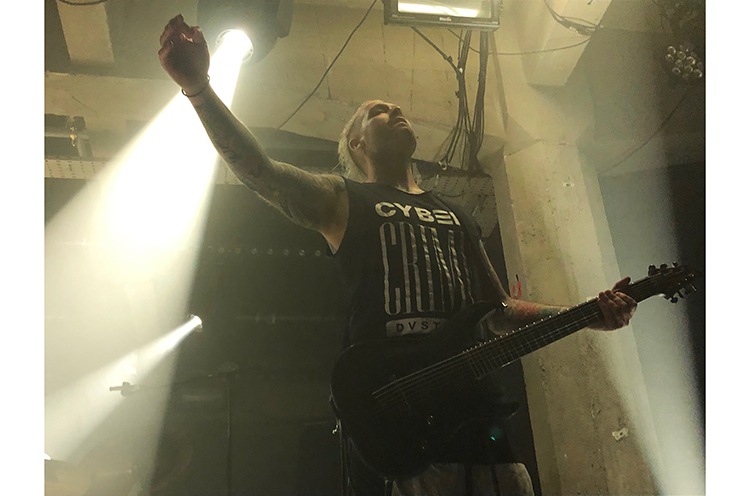
GG: So, Sean takes your guitar sounds and re-amps them with, effectively, we’re talking about going straight to the computer, then finding the plugin or re-amping. What next?
CB: For all of the debut record (called 3TEETH), I just did mono, I don’t think there are any ‘spread’ guitar parts. It was all mono. During the time we were doing that, there was a certain time we have to turn it in. We were kinda like, just trying to get all of the rest of the songs done. I think Eradicate was the last one of the songs we had to get done, you know?
GG: Ok.
CB: Um, and yeah there were all mono, nothing was spread because the bass is in there and takes up a lot of the side. You know, ‘Atrophy’ has that, a big bass that’s distorted and takes up some of the sides with the guitar. We kind of layer it, you know? And in Divine Weapon, we had...I think I used a patch in Massive.
GG: Native Instruments Massive?
CB: Oh yeah, we all use...Xavier’s (3teeth keys/synth player and co-producer) really good on Omnisphere (Spectrasonics synth plugin), a lot of the stuff is Omnisphere. We use a lot of the Prophet 12...
GG: The plugin?
CB: No, the hardware synth. Andrew has the Tempest, another Dave Smith thing and then a lot of modular stuff. The modular stuff is a little bit harder, because, unless it’s all modular synth, it’s really hard to put a modular synth in with tuned instruments.
GG: You have to begin with it, don’t you?
CB: You have to begin with it, yeah! You have to have the hook, which we kinda did with Dust, which is a modular song. It’s a modular synth patch that Andrew did, and a Reaktor patch that we use.
GG: Nice. Now, bass: you’ve referred to bass a few times already. You guys don’t have a bass player...
CB: We do!
GG: Correction: you guys have a bass player! (laughs) (Note: 3TEETH band member Andrew used to play a digital drum kit live, but has moved across to bass for live gigs now)
CB: We do now. So, there wasn’t any acoustic bass in the first record. For the Shutdown album, I layered a few of the songs with a real bass but we mostly always have synth bass, so...or sub bass in our tracks.
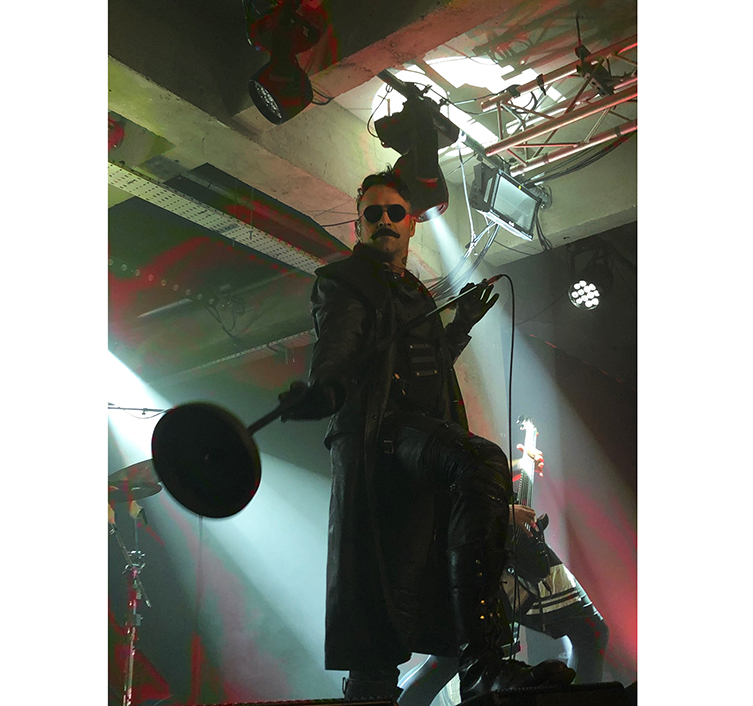
GG: And when you’re playing that live, is that on backing track?
CB: Yeah, the backing would be with the synth or the sub bass. A lot of the higher end synths, Xavier would just play live because you don’t want to fuck with the low-end frequencies, especially they all have to be tamed. And mono, they have to be mono: it can’t have, like, phasing issues. So we usually keep everything that’s like 200 or 250 below (Hz), we keep that: it’s like a bass in the backing.
GG: OK, cool. Now, moving specifically to you and your job as the ‘chainsaw operator’: has it always been 7 strings?
CB: No, the first album was a 6 string, tuned to C#, standard C#. A lot of those songs, the root was C#!
GG: A lot of times when you open up a new project, your Ableton Push or whatever will automatically sit at a certain key...
CB: Oh yeah!
GG: And you just start playing in that key all the time!
CB: That’s why I never fucked with those things! Xavier’s really good on the Maschine. We used the Maschine, well, he used the Maschine quite a bit on Metawar for some different textures of drums. But...what were we saying? (laughs)
GG: We were just talking about...well actually, we were talking about your guitar, but we’ve moved over to how hardware quite often dictates where you ever start at.
CB: Oh yeah!
GG: But you were playing in...C#, did you say?
CB: Yeah, and I toured with a...I had this beautiful fuckin’...
GG: It was an ESP, right?
CB: Well yeah, I had that for my second one, but I had a...cuz that was the first 7 string that I bought. An ESP Horizon II and that thing was like a fuckin’ Spear of Destiny, you know? The neck was like (mimes something huge), I played it like this (stretches), it was so long, it looked like a bow, you know? A fuckin’ sword! But I had that, and I needed a backup guitar and I wasn’t really getting any...they weren’t really getting back to me and like...
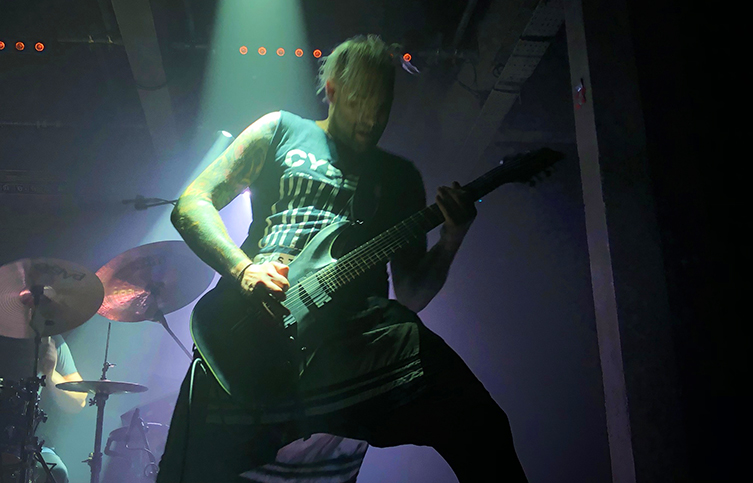
GG: ESP weren’t getting back to you?
CB: Yeah, cuz you know I bought that guitar. I got a little bit of a discount, but they weren’t getting back to me. So Schecter, actually Sin (Quintin, guitarist from Ministry) actually put in one of the good words for me with Schecter.
GG: Ah, good! Good!
CB: Yeah, and then I met the dudes over there and they were all super cool, they listened to the first record, and after that had been out for like a year or two, I got on Schecter. So I went from...I had a Gibson Les Paul, a Black Beauty, which is like the most expensive guitar I’ve ever bought!
GG: Same here!
CB: It was fuckin’ crazy expensive.
GG: But you can’t out-cool one of those.
CB: Yeah. It was absolutely ridiculous. So, I had the Gibson, and got rid of the Gibson Les Paul, and I think Slavegod was the first one that I did on the 7 string.
GG: First one that you actually specifically wrote on a 7 string?
CB: Yeah, wrote it on a 7 string. And that was, basically I kept a tuning of C# so I could play all of the first record, and then when Shutdown came out, when we were writing for shutdown, it was just adding one more string, a G#. So it was like Standard, like G# Standard, and I could still play all of the old stuff on the 6th string.
GG: So that’s like a whole...is that a 4th lower?
CB: Yeah.
GG: That’s ridiculous.
CB: Yeah.
GG: And is that what 3TEETH’s tuning currently is?
CB: No! (laughs) I tune down to Drop F and Drop F#.
GG: That’s 8 string tuning, effectively.
CB: Yes.
GG: Phwoar!
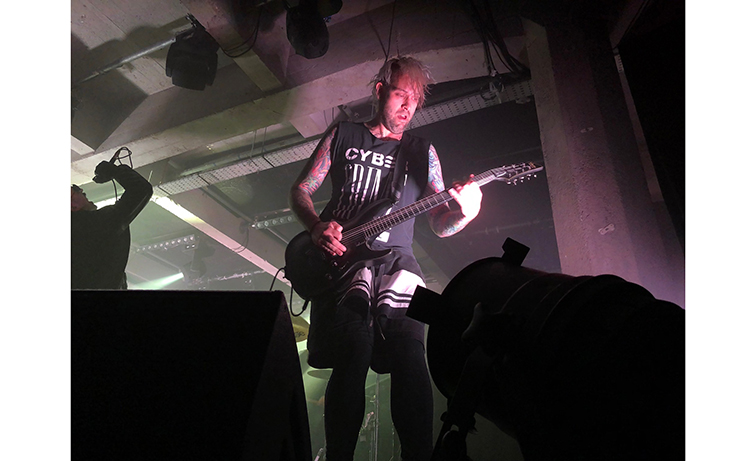
CB: And I’m barely getting away with it! Like, the guitar is a little, like, travelling with it, with this low a tuning cuz I haven’t done it yet, it’s a little wonky. And I don’t have a tech, so I don’t really...I don’t wanna fuck with it and fuck it up, cuz I only brought two guitars.
GG: What two guitars are you using?
CB: Right now, I’m using, it’s a Maus C7 from Schecter, which is a discontinued guitar and it is my favourite guitar. It’s not a Hipshot bridge that’s on it, cuz a lot of bridges now are like the Hipshot and they’re not up like that (mimes a TOM-style bridge), slanted down and I like the slanted down ones. The Hellraisers have it, from Schecter.
GG: I have a Schecter 7 string with that on it, I know exactly what you mean. You need the pitch.
CB: Yeah, I need the angle that goes up and the strings come down to rest. I’m a lot faster on that. I feel like I’m just kind of digging on the other guitar.
GG: Like your hand’s too flat against the body.
CB: Yeah, exactly. I just used to that other way, and I can play it just as good but it’s like, still...
GG: There’s a bit of a disconnect then, with you as a player, because you don’t get exactly what you want.
CB: Oh yeah, yeah. I mean, I got used to it because it’s something that I , like, it’s the tool, until I get like a custom guitar, which will be something that hopefully we do in the future, you know, with 3TEETH, you know, the Chase guitar, which I’ve got all these crazy ideas for and shit, you know!
GG: Nice! I bet you do! So, are your guitars baritone in scale length?
CB: No, I think they’re just standard.
GG: Like 25 and a half?
CB: Actually no, they’re 26 or 27...
GG: That might help with your low tunings?
CB: Yeah, cuz then I play...my string gauges...I was playing this whole other thing where I could barely bend my strings, and then Todd, who sets up the artist guitars for Schecter, so he’ll set up Sin’s and Cesar’s (Soto, Ministry’s other guitarist) and mine and the guys from (Marilyn) Manson and shit, he recommended this gauge. So: I’ve got an .080, a.062, a .044, a .032, a .022, and then maybe like a .017 and a 0.011.
GG: Wow.
CB: Yeah.
GG; So, eleven on the light and it’s kind of a custom gauge and an eighty on the bottom.
CB: Yeah.
GG: Which is...which is...
CB: It’s a fuckin’ bass string!
GG: Yeah, it’s a bass string man! The 8 string sets that you can buy don’t even have .080’s in them! I’m just thinking back to my shop floor days...
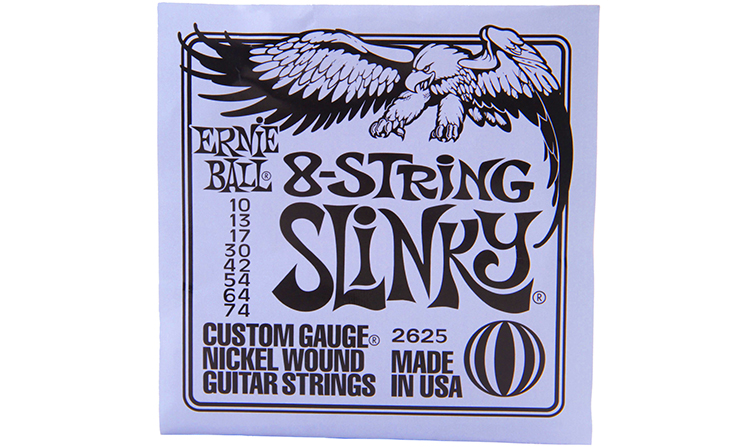
CB: There is an Ernie Ball...so, recently I got on Ernie Ball with, like, the artist discount which, like, it helps.
GG: Of course.
CB: Like fuckin’ preparing for a tour, it’s like...I had to get in-ears made (laughs), it’s all just fucked up, you know? Now I’m broke before I even start work!
GG: It’s a good life being a musician, isn’t it?
CB: Totally. It’s glamorous. (laughs)
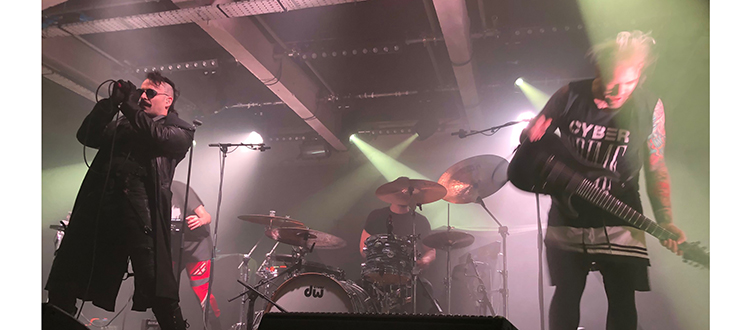
GG: So, you’ve got two Schecters...
CB: I have four altogether.
GG: Okay, four altogether. and is it mainly EMGs you go for?
CB: Yep! The 87X is my main one.
GG: I haven’t heard the new record apart from the singles, but with 3TEETH, you don’t tend to need clean sounds very often, right?
CB: No. Haha! No, actually, actually, there’s one...no, fuck, there’s three songs- we went out of the box on this one- there’s three songs that have a clean guitar in one part.
GG: Good on you!
CB: Yeah! And there’s some little bits of solos...
GG: Ahh! Ok!
CB: A little more like ‘Depeche Mode’ solos. My thing is less is more, like a counter melody on top of the bassline. Like you hear one of ‘Pumped up Kicks’, like the progression for that song, like all pop songs, is very standard, nothing new or anything, but it’s how you make it sound: how you effect the guitars, how you effect the keyboards...
GG: In the context of your music, that chord progression sounds quite strange and fresh though.
CB: Oh, totally! There’s a lot of layers in that chord progression and in that track. There’s a lot of weird, haunting synth layers. I did like hours and hours of feedback loops that we chopped up, fuckin’ put it in there, a lot of crazy shit. Lex’s (3TEETH vocalist) vocals have a lot of layers in the last chorus there.
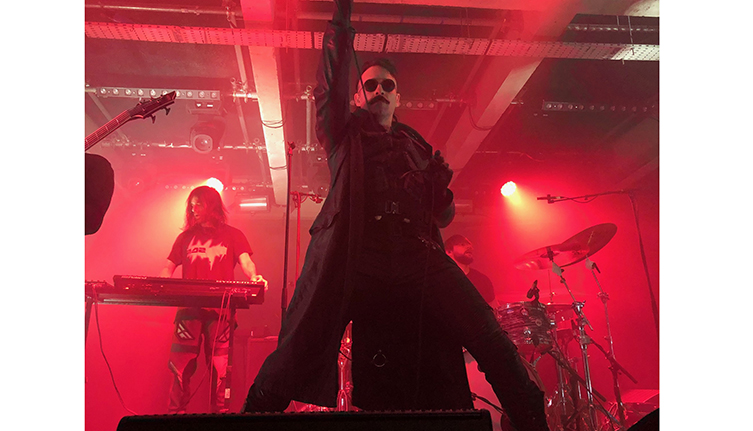
GG: And he’s getting vocally more confident with every release as well.
CB: Yeah.
GG: More singing.
CB: Oh yeah! Because, you know...
GG: Not that he isn’t a confident man, he obviously is, but he’d never been in a band before...
CB: Yeah, he hasn’t been in a band, you know, and it takes a lot to, uh...
GG: He was like a frontman first and a singer after, right?
CB: Yeah. I mean, he’s a frontman for sure, you know.
GG: Oh yeah! The guy owns it.
CB: As a vocalist, he’s like a really good lyricist, like his lyrics are fuckin’ insane. When I try to write lyrics, I don’t know how, like, where to grab from. I’ll paint, I’ll make a riff...
GG: Because you can’t say it. Otherwise you’d say it!
CB: Otherwise I’d say it. Right.
GG: Indeed man.
CB: Totally.
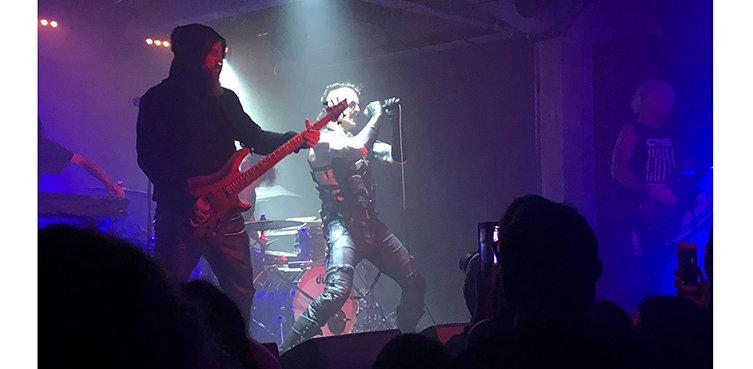
GG: So, let me just refer to my little sheet here. Dealt with, dealt with, done, done, oh! Here’s one. Plectrums! Picks! It’s a subject for me.
CB: Oh, I don’t play anything but these dudes right there. That is my ultimate, favourite pick in the whole wide world, and if they read this interview, they should fuckin’ hook me up.
GG: Who makes this? (It’s a textured orange plectrum, regular shape, pretty thick.)
CB: It’s a Snarling Dogs.
GG: No way! Those guys who made those mad old Wah pedals with the light-up dog eyes on them!
CB: Maybe? The company is called...
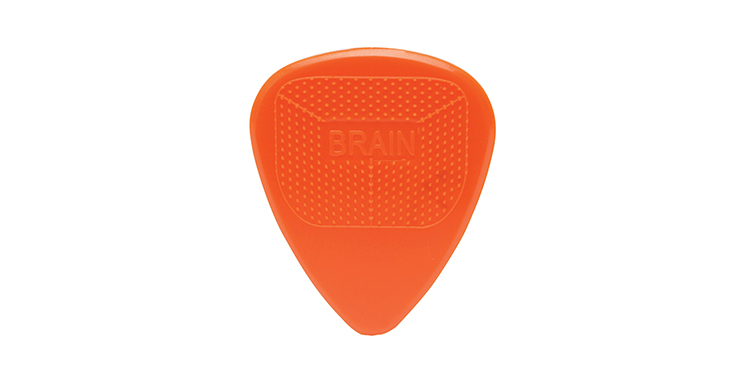
GG: Why does it say ‘Brain’ on it?
CB: Cuz it’s like Snarling Dog Brain Picks.
GG: Ah, 1.14mm, I’m telling myself this since it’s audio and I can’t see what I’m looking at here (laughs). It’s textured.
CB: Yup, I sweat so much, it’s the only one that can stay in my hand.
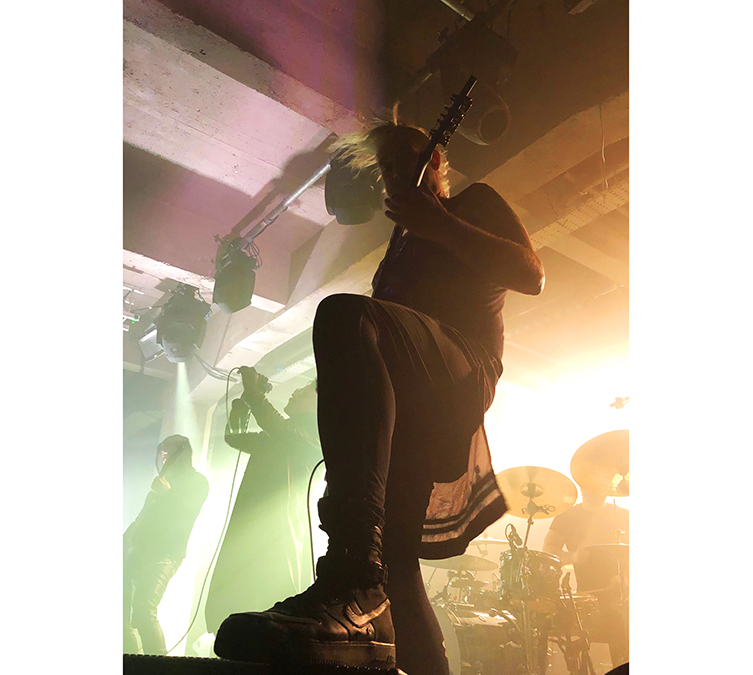
GG: Got you, got you. Do you know the trick with the knife? Scoring a cross hatch into the pick to make a grip?
CB: Really? I used to play bass before I played guitar and I got these standard Dunlop picks like everyone has: everyone tries Dunlops. But once I found out about these, here, take that one.
GG: Woo! Thanks man, I’ll try it out! So, the other thing you might want to try with this type of pick is, I was talking to Cesar and Sin about this, but you turn it around that way (turns it backwards) and you play some U2 guitar parts, that’s how The Edge gets that ‘chka-chka-chka-chka’ sound.
CB: Really?
GG: Yeah, see because it’s got the dimples on it, he uses it to strike the string and it catches differently.
CB: Oh yeah! Oh, yeah!
GG: Because I know you’ve always wanted to sound like you play in U2, right? (laughs)
CB: Totally! (laughs) There is actually a part in Blackout that kinda sounds like U2. I fuckin’ riff that shit up all day.
GG: It’s the key for success, man. The key for success!
CB: Yeah! So, Snarling Dogs Brain Pick, 1.14mm. I sometimes used to use the .88mm but for some reason I’m on the 1.14’s. Partly because I tune so low.
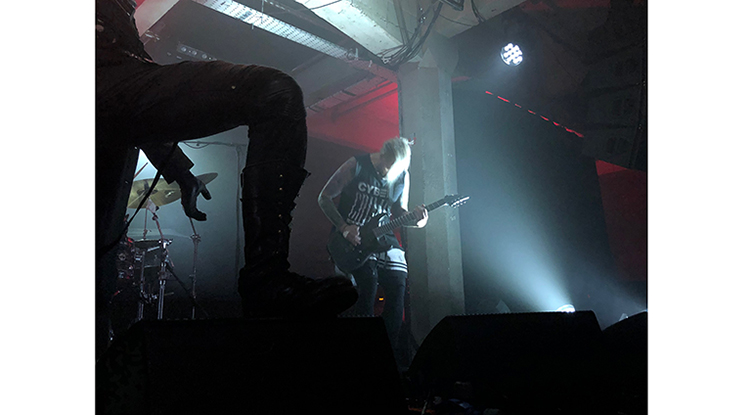
GG: Why don’t you play an 8 string guitar?
CB: Right now, it’d confuse me. I’d need at least a few months to practice with an 8 string.
GG: Fair enough.
CB: Cuz I know my way around a 7 string and I can, like, play all the old stuff and not even hit the 7th string and disturb the tracks, you know.
GG: It’s like you don’t even really need the high E string and so an 8 would be one string too many, I guess.
CB: Oh yeah, totally. And like, Todd set it up just right so it’s like, not blown out, you know? It’s a little rattly on my 3rd or 4th fret, wherever I’m at, you know, and it’s kinda hitting my fret a little bit? I might have Brian (Ministry’s tech) take a look at it. He’s awesome.
GG: So what are the other Schecter guitars? You have four, right?
CB: Yeah, so I have my primary guitar, that I’m using for all of the Metawar stuff, and I play Divine Weapon on it because I don’t wanna switch guitars right away so I just transpose Divine Weapon up, like up 3 or 4 frets and just play it in C.
GG: Okay, got you.
CB: Andrew again has to do all that for the new stuff too. He plays all in the same box as I do for the bass, he plays a 5 string Schecter Hellraiser, actually he plays an Evil Twin now, I got him hooked up with that, he plays it either 1 or 2 up, I forget what it is.
GG: And what guitar is it you’re on, the main one?
CB: It’s a C-7 Maus.
GG: Maus?
CB: Yeah, M-A-U-S.
GG: Ahh, cuz it is cooler if sounds German, obviously.
CB: Yeah! (laughs) So I do that, and I just got a new guitar from them, the Evil Twin 7 string.

GG: Is that one of the Apocalypse ones? Kind of a red colour?
CB: No, that’s the, uh, I don’t have that one. But I did have a guitar that had the Apocalypse pickups in it.
GG: With the red bobbins and wire?
CB: Yeah, yeah. I just took ‘em out because they didn’t suit our tuning. There’s certain stuff, like, I tried a lotta amps for this last record. We really wanted to use a lot of amps...
GG: Real, physical amps?
CB: Yeah, physical amps, and for some, there was just too much EQ work to be done and it just didn’t sound good. You couldn’t even hear the amp anymore. I realised, because I’m an (audio) engineer, Xavier’s an engineer, we’ve all been producing for, and Andrew’s an engineer, we’ve all been producing for a little bit, not too long.
I just found out about, like, pitch the frequency, cut the frequency of what you’re tuning, of what your root note is, is kinda the deal, so I just found like a comfort zone of a straight cut at, like, 81.5Hz if I’m in drop F or F#, and then I’ll cut the guitars at, like 12.1Hz or maybe 10.1Hz if we have a lot of synths in the recording.
GG: Give them a bit of space.
CB: Yeah, yeah.
GG: And with at least three of you being engineers, are you all involved in the engineering of the 3teeth stuff? Or does somebody in particular take charge?
CB: Yeah, it’s usually Xavier and I: we’ll go back and forth. I’ll usually do all the guitar parts, you know, come up with like a 16-bar part with either a progression, or a melody in there, a synth line or something, or an intro. I like to work kind of left to right: I like to paint a picture from an intro, to a verse, to a pre-chorus, chorus, or a pre-chorus back to a verse B, you know?
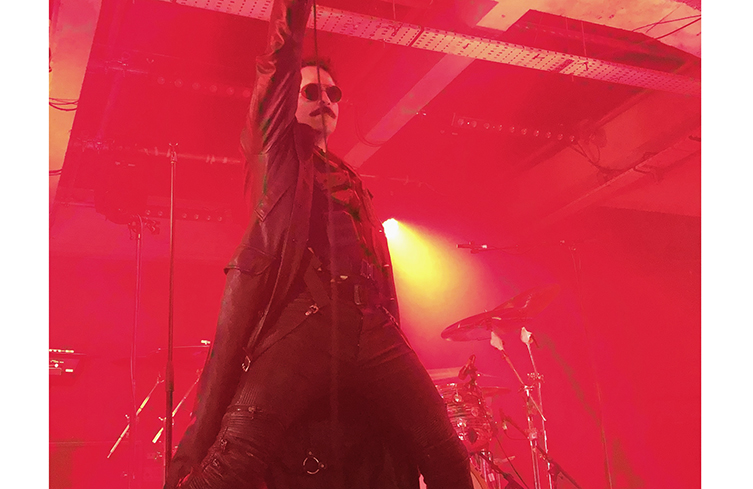
GG: Yeah, linear.
CB: Yeah totally. And Xavier will get in there and really hone in on maybe a 16-bar loop and how the kick drum hits with the bass. He’ll get in there and like, start carving frequencies or adding frequencies. He’s got some ears!
GG: Like shelving.
CB: Yeah! Totally! Like, he’s got the best ears in...he’s got like, fuckin’ raccoon ears. (laughs) Like he can hear like mosquitoes and shit, you know? Cuz there’s stuff where some of the tracks where it would sound like white noise, like hissing and stuff in the tracks? You can’t really hear it but if you take it out, the track doesn’t have that haunting vibe anymore. He’s putting stuff in that’s like, carved out, just at like 1 to 3k or like 3k to 10k weird...
GG: Like adding atmosphere.
CB: Yeah! Atmosphere.
GG: Which is as valid an instrument as anything else.
CB: Uh-huh!
GG: Especially in that type of music.
CB: Oh, totally! I feel like, with Metawar, we’ve really taken up the frequency range in the tracks.
GG: That’s always been the case with 3teeth. Production was always a factor, it was always a priority.
CB: Yeah, and just, like substance. A lot of technology-based music, it just feels hollow right now. We’re just writing what we want to write, and each person has their own strong suit.
GG: So you play to everybody’s strengths.
CB: Yeah. Totally.
GG: So, in terms of pre-3TEETH, what were your influences growing up?
CB: I mean, I was into Pantera, probably one of my favourites for guitar riffs. Like Far Beyond Driven. That was considered kind of Industrial to me, like those fucking squeals and those fucking wails that he (Dimebag Darrell) was doing on the guitar...
GG: You can hear a lot of Dimebag’s influence in the 3TEETH guitar sound.
CB: Oh yeah, yeah. But y’know, my dad put fuckin’ Sabbath’s We Sold Our Soul For Rock ’n’ Roll in my fucking stocking for Christmas when I was about ten so that too.
GG: Chase’s Dad: good guy.
CB: Yeah, totally! He got me that, he got AC/DC’s Back in Black, Zeppelin, and I kinda got into that for a little bit. Then I really liked...he had a bunch of INXS records and shit and so I was into then when I was very little...like, Oingo Boingo and kinda weird shit, but the production sounded really good. Those INXS records, like the snares...
GG: It was all about production for those guys too.
CB: Yeah totally! And then I got into Punk, and got into the big Grunge/Punk/Nirvana/NOFX...I grew up in Costa Mesa, Newport Beach, which is kinda...
GG: Is that South of LA?
GG: Yeah, it’s like So-Cal, so it’s like an hour from LA, from Hollywood.
GG: On the way to San Diego?
GG: Yes.
GG: Got you.
CB: I grew up surfing. My babysitter gave me my first bass, this big Fender Jazz bass, or was it a P-Bass? Something like that. And I, ah, started playing that and playing fuckin’ Nirvana and Misfits stuff, learned a lot of (Misfits album) Static Age shit. It was simple for me to get it down cuz I would tab it out and then I would just play it on a cassette in my garage, little amp.
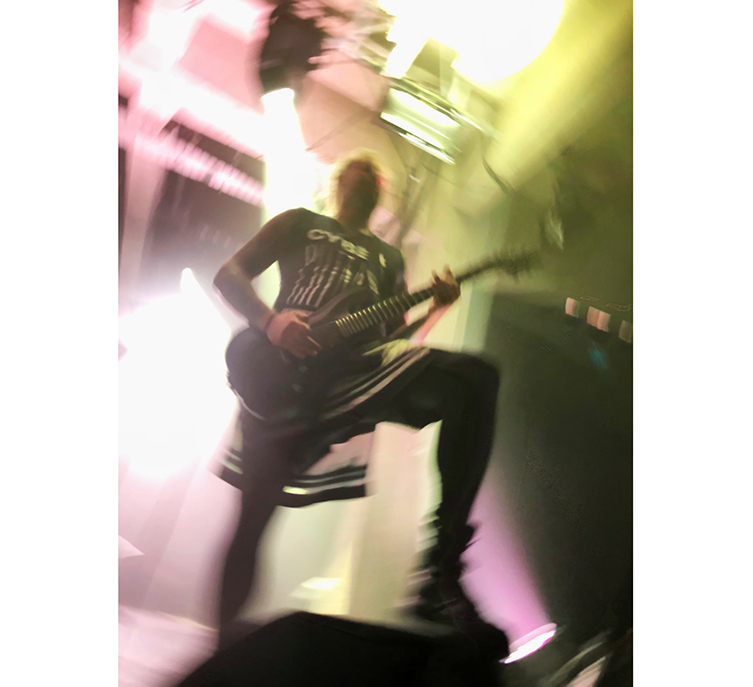
I went from a little amp and a bass, to a guitar. My parents got me a Fender Squier and then I really got into Rage Against the Machine, I had a poster up in my room when I was little, you know? And then I was like ‘I have to get a fuckin’ Marshall half stack, I fuckin’ have to!’ (laughs) I got this Valvestate which sounded sick! We actually use a Valvestate kind of setting in our set.
GG: Yeah, it’s legit!
CB: Yyyyeah.
GG: That’s the early Meshuggah sound.
CB: Yeah, exactly! I blend it in with some of the stuff. So yeah, I got into all that and then I got into more classical music. Later on, I heard a piece by Sergei Rachmaninoff and it was like ‘holy fuck!’ It changed my world, like ‘Holy shit, what is this?’ It was crazy, my neighbour’s piano teacher was playing it and I just happened to walk into his house and I was like ‘What the fuck is that?’
GG: There’s lots of technique.
CB: Oh my god yeah! And it was very dramatic and romantic. Romanticism stuff. And he had big ol’ fuckin’ fingers (laughs) where he could reach across an octave and then some from his thumb to his fuckin’ pinky! His chords were crazy sounding, you know? He was a genius.
GG: Those moments.
CB: Oh yeah. So it struck me, and I got really into playing piano/keyboard when I was 18. I got like this cheap Casio. It had just string sounds.
GG: That’s what I did too: Rage Against the Machine and then Classical music. The same path.
CB: Yeah, the exact same! The exact same shit! I got into that, and I never stopped playing the piano. The piano’s always been very influential. Even if I don’t play it live or whatever, I still try to practice it a few hours a day, cuz that’s where a lot of the melodies come from.
GG: I was gonna ask that: is piano a writing tool for you?
CB: Oh yeah, usually chord progressions come from the piano and are just transposed.
GG: A lot of what I like about the 3TEETH riffs are the kind of semi-tone ‘Brrrr’ bends. That kind of seasick sound. That’s wicked. Is that something you go for?
CB: Yeah, absolutely! That’s like a kinda signature I wanted to get. I thought Borland did it real good in Limp Bizkit. Yeah, Nu Metal shit is cool, I like that shit!
GG: Nobody who is a musician can say anything bad about Wes Borland, right?
CB: He’s got riffs on riffs. He’s a scientist too, you know? He gets down on his fuckin’ tones, and he tweaks out and his rig has like keyboard amps. Those might catch, like, low frequencies better.
GG: Like a flat-response kinda deal?
CB: Totally.
GG: He’s amazing at putting precise whammy bar bits into his riffs too (hums intro to Limp Bizkit song ‘Douchebag’).
CB: I was thinking about getting a whammy bar on a 7 string for this tour but everything I was doing was sounding kinda similar.
GG: Do you think it’s just about putting in the hours, though?
CB: It is putting in the hours!
GG: It’s like when we were talking about painting earlier. Picasso said: ‘genius exists, but it has to find you working’.
CB: You gotta be doing it!
And right at that point, Chase got his message to go and soundcheck. We agreed to catchup after the show. I sat outside, sipped my coffee and reflected on what an unusually good day it had been. Just then, a familiar, moustached figure sat down next to me and for the next hour or so, I enjoyed a fascinating, and cheerfully frank, conversation with Lex, 3TEETH’s vocalist and visual artist.
He eventually had to go too, so I made myself scarce until showtime. A large crowd had assembled for 3TEETH, and the band delivered a performance of huge power and confidence. Despite audio issues, they delivered their prophetic, Future-Shock message with assured commitment and not a little star power. Theirs is a show not to be missed by anyone who appreciates ‘heavy’. It’s fresh and familiar at the same time, with atmosphere and energy to spare.
After this came Ministry, which you can read all about right here. All in all, that day and evening were filled with a kind of futuristic energy, of a shared mission to bring the sounds of technology and live musicianship together, and the sense that this was a mission worth being involved in.
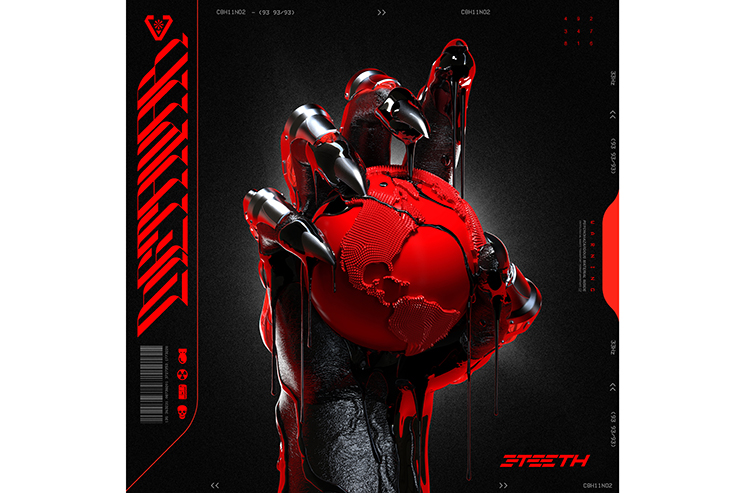
3TEETH’s explosive, bristling new record, Metawar, is now available on Century Media Records. The band are touring in support of it at the moment, so go to their website to keep up with their current whereabouts. You can also follow 3TEETH on Facebook.
Check out our collection of Schecter 7 string guitars.
We like to thank Chase for giving us his time, especially after such a stressful previous day! It’s onwards and upwards for 3TEETH.



